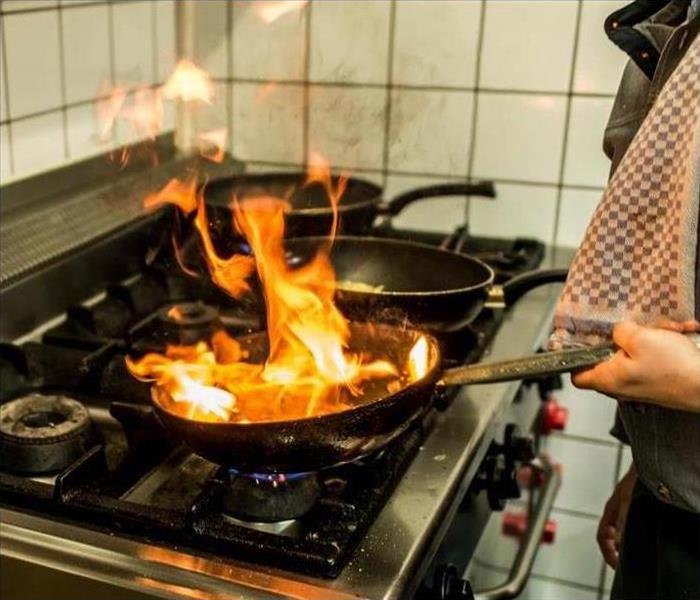7 Ways To Reduce Kitchen Fire Risk While Cooking
8/4/2023 (Permalink)
After a long day, kitchen safety may not be at the top of your mind. You just want to prepare a meal, sit down and eat. However, most residential fires begin in the kitchen. Fortunately, there are some simple tips for significantly reducing your risk of a cooking fire at your home in Pueblo, CO.
Limit Your Risk of Fire but Be Prepared for Fire Damage
- Watch Cooking Food
One of the most essential kitchen fire safety measures is to stay in the area while food is cooking. A fire can begin in mere seconds, which means it could become out of control before you even realize something is burning. If you need to leave the kitchen, recruit someone to watch it.
- Have a Fire Extinguisher Within Reach
It's always helpful to keep a fire extinguisher within reach in case something bursts into flames. Extinguishing the fire within seconds can mean the difference between minor to no damage and total devastation. Also, make sure everyone knows how to operate the fire extinguisher properly.
- Learn the Proper Fire Extinguishing Techniques
No two fires are alike. Some methods of extinguishing a specific kind of fire can actually make another type of fire worse. Keeping a pan lid over a fire will typically extinguish it. One of the most important tips to remember is to NEVER put water on a kitchen fire, particularly a grease fire, as it can make it spread fast and harm you in the process.
- Be Careful With Hot Grease
Grease fires can be the most hazardous type of kitchen fire. Cooking oils can present significant hazards if used at temperatures above their smoke point. These oils begin smoking at different temperatures, so it's essential to be aware of the line and not cross it when cooking.
Also, don't let the hot oil and grease near flammable materials (including trash in your trash can) until they are completely cooled.
- Keep Emergency Phone Numbers Close
There's always somewhat of a risk that a fire could break out in your kitchen, so just as you keep a fire extinguisher close by just in case, it's also good to have emergency phone numbers within reach. Post any numbers you may need in case of an emergency in the kitchen for the whole family. These numbers include the direct numbers for your fire and police departments, as well as the numbers for fire damage restoration professionals and friends and family who should be notified.
- Maintain Your Smoke Detectors
Many people forget or avoid maintaining their smoke alarm system. If something starts smoking or a blaze begins, a well-maintained smoke detector will quickly alert you. The most important thing is to replace each unit's batteries at least twice a year and test the devices to ensure they're working correctly. You also need to keep them clean and dust-free.
- Be Mindful of Flammable Materials Nearby
While you're cooking, it's essential to remain mindful of flammable materials near hot appliances and food. Keep long sleeves rolled up, and don't wear baggy clothes while cooking. Also, be aware of towels, curtains, papers and other combustible materials such as aerosol cans and lighters.
A fire in your kitchen can get out of control quickly. Keep your family and home safe by following these tips for cooking safely.





 24/7 Emergency Service
24/7 Emergency Service
